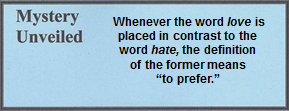12.03.02 Lk. 14:25-33
THE COST OF DISCIPLESHIP
25 Now great crowds were traveling with Him. So He turned and said to them: 26 “If anyone comes to Me and does not hate his own father and mother, wife and children, brothers and sisters — yes, and even his own life — he cannot be My disciple. 27 Whoever does not bear his own cross and come after Me cannot be My disciple.
28 “For which of you, wanting to build a tower, doesn’t first sit down and calculate the cost to see if he has enough to complete it?
29 Otherwise, after he has laid the foundation and cannot finish it, all the onlookers will begin to make fun of him, 30 saying, ‘This man started to build and wasn’t able to finish.’ 31 “Or what king, going to war against another king, will not first sit down and decide if he is able with 10,000 to oppose the one who comes against him with 20,000? 32 If not, while the other is still far off, he sends a delegation and asks for terms of peace. 33 In the same way, therefore, every one of you who does not say good-bye to all his possessions cannot be My disciple.
There are three issues with this phrase, “and does not hate his own father and mother,” that challenge modern readers:
- This passage sounds offensive, especially within a culture where respect was a high virtue. In English the words hate and love are generally considered to be polarized opposites, but in Hebrew these terms do not have the same degree of absoluteness. When love is placed in contrast to hate (Gk. miseo 3404), the former means to prefer;[1] a relative preference for one thing over another.[2]
- It is in bold contrast to the character and nature of Jesus
- It is in bold contrast to the Hebrew commandments specifically concerning respecting and honoring one’s parents.
The words “love” and “hate” are not emotional words, but refer to the will of a person. The phrase is a hyperbole and, as such, does not have a literal meaning, but it is an exaggeration to emphasize a point. “Love,” means to choose or to prefer[3] to submit to authority and “hate,” means to refuse to submit to authority.[4] The concept is repeated in Mark 10:29-30. God referred to Jacob and Esau with these words in Malachi 1:2-3 and Romans 9:13. When God said He “loved” Jacob, He meant that Jacob had been chosen by Him. A second interpretation is that “love” is an emotion of concern for someone’s best interest and “hate” means to love less.[5] These words are often considered polarized opposites in English, but in Hebrew, these do not have the same degree of absoluteness.
This statement was not shocking to the original listeners because they understood the context in which Jesus spoke. This context is the cost of being His disciple. Clearly, Jesus desires one to be fully dedicated to Him, even if it should break family ties. That is precisely the point! His disciples are expected to love Him so intently that, in comparison, love for parents or anyone else would appear to be as hate. This certainly does not mean a believer should hate their parents – far from it. However, love for family, no matter how great it is, is actually diminished in light of the believer’s love for Jesus.

Here is a personal example of love / hate within the family. While teaching at a seminary in Jordan, this writer met an Arab Christian who had two wives. He married his first wife, but after ten years, she did not give him any sons. At the time he was a Muslim and had the right to marry a second wife who then gave him a son. A short time later, he accepted Christ. I asked him how he got along with his two wives. He said that they got along well, but he truly loved his first wife so much that, in comparison, he hated his second wife. But he said he loves them both and desires to see them become believers. His situation is the classic example to which the Apostle Paul wrote about to Timothy in 1 Timothy 3:2.
“After he has laid the foundation and cannot finish it.” The comment concerning someone who started a construction project but could not complete it seems almost ridiculous. Of course no one would consider doing something as stupid as this. Yet, it was not an unknown event, but one well-known to everyone due to the political figures involved.
When Herod the Great died, his little kingdom was nearly bankrupt due to his expensive lifestyle and extravagant building projects. Construction projects begun became construction projects unfinished. One of them was an aqueduct he started to supply water to the temple that remained unfinished for decades. A number of other building projects were started by his sons but also remained unfinished. The reason was that the people became so impoverished under Herod, that the required tax revenue could not be collected to complete them. The Herodian dynasty laid a number of “foundations” but could not finish them.
[1]. Bivin, “Jesus’ Attitude Toward Poverty.” Yavo Digest. 1:5, 3.
[2]. Vine, “Hate, Hateful, Hater, Hatred.” Vine’s Complete Expository Dictionary. 2:292.
[3]. Bivin, “Jesus’ Attitude Toward Poverty” 1:5, 3.
[4]. Pentecost, The Words and Works of Jesus Christ. 331-32.
[5]. Herbert, “Hate, Hated.” 102-03.